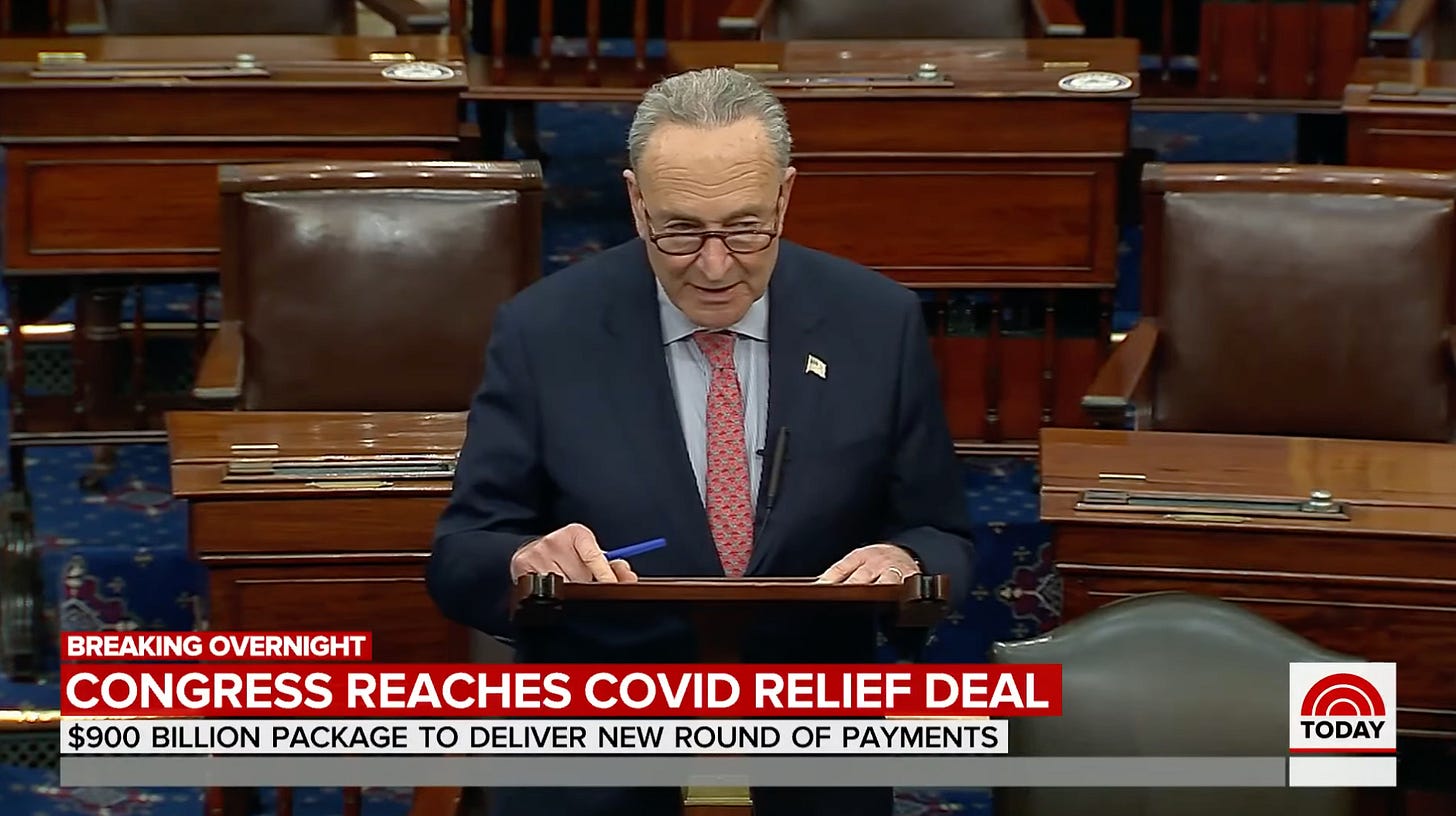No, New York Times, This Deal Is Not Good Enough
The stimulus package is woefully inadequate. Why is the Times celebrating it?
After weeks of mind-numbing negotiations, Congress has agreed on a deal for a new COVID relief bill. The $900 billion package is expected to include a new round of stimulus checks and unemployment assistance, but at half the levels of last spring's CARES Act; the checks will be capped at $600 instead of $1200, and the unemployment benefits, which will last for 11 weeks, will top out at $300 instead of $600. There is also some money for small businesses and vaccine distribution, and a month-long extension of the federal eviction moratorium, among other things. There is no money for state and local aid.
Anyone looking at this deal can see quite easily that, while any aid is good, the package is not good enough. It is less than half as large as the CARES Act, and is arriving at a time when the pandemic is ravaging the country more than ever before. It will not meaningfully help states and localities which are in danger of completely flatlining. It will not do enough to help the millions who have been pushed into poverty as a result of the pandemic. It was the product of a deal between a Republican Party hell-bent on providing as little help as possible and a Democratic Party which, true to form, systematically handed over huge chunks of its leverage, probably dooming many millions of people in the process.
You don't have to take my word for this. Analysis after analysis has concluded this. Here's the Washington Post:
Economists and policymakers expressed relief as Congress announced a deal Sunday on a $900 billion stimulus package to aid the rapidly deteriorating economy, but the smaller size of the legislation, the omission of several key provisions and the fact that some of the aid expires in March left analysts warning that more spending may be needed next year.
[...]
This latest bipartisan relief package omits direct state and local aid, and it only extends federal unemployment benefits to mid-March, even though millions of people probably will be out of work for far longer. Overall, the bill’s price tag shrank from $2 trillion to below $1 trillion, a product of a legislative compromise that was forged between Democrats and Republicans, who were weary of adding to the nation’s debt load.
“This is better than nothing, and there’s some good news that we’re finally getting a deal,” said Kathy Bostjancic, chief U.S. financial market economist at Oxford Economics. “The bad news is it’s less stimulative than the prior packages, and the relief measures are short-lived.”
Hell, even Larry Summers thinks this bill sucks!
It was beyond weird, then, to see the New York Times editorial board roll out the red carpet for the deal in an editorial on Sunday. From the piece, titled, yep, "This Deal Is Good Enough":
The $900 billion pandemic aid package that emerged Sunday from months of on-and-off negotiations between House Democrats and Senate Republicans is a necessary measure that will ease the suffering of millions of Americans. It will help unemployed workers to feed their families and to avoid eviction. It will help small businesses avoid bankruptcy. It will help to keep the trains and buses running in cities across the country.
Congress should have acted months ago, and the delay has caused a lot of unnecessary pain. Even now, Congress is not doing enough to meet the full measure of the need. But the relevant question is whether this agreement will help — and the clear answer is yes.
That's actually not the relevant question! The relevant question is "will this bill do enough to help people for the long term, given the very shaky prospects for another round of stimulus during a Biden administration?" If I was broke and you handed me a dollar, it would be better than having zero dollars. It would not be sufficient to really help me, especially if it seemed clear that I would never be getting money again. Mitch McConnell, as the Times editorial itself notes, has openly said that he wanted to get a deal done to help his candidates in the Georgia Senate runoff. What's his incentive to help after those races are concluded?
Don't worry, though: the Times does understand that there are issues with the bill:
Still, this deal is overdue. As the earlier round of federal aid began to lapse over the summer, a chorus of loud voices warned that the failure to act would cause needless pain for millions of American families and that the economy might slip back into recession. Those warnings were on the mark. Consumer spending is falling, and unemployment claims have rebounded.
In the spring, even as joblessness surged, federal aid prevented any significant increase in the share of Americans living in poverty. Since then, the poverty rate has increased from 9.3 percent in June to 11.7 percent in November — the largest increase in a single year since at least 1960, the earliest year with available data.
"Still, this deal is overdue" is about as much as you're going to get from the New York Times editorial board about the beyond scandalous delay in relief from the federal government. It's a wildly blithe way of handling the betrayal from the people in power.
I would understand if people in Congress wind up voting for this thing, but this is not a deal to jump for joy about. It is not a triumph of statecraft or an example of how Congress can band together in a crisis. It is evidence of how paltry and tawdry our lawmakers are, and how little we can expect from them. It is a woefully inadequate band-aid on a gushing wound. It is not good enough. How depressing that the Times doesn't seem to get this.



